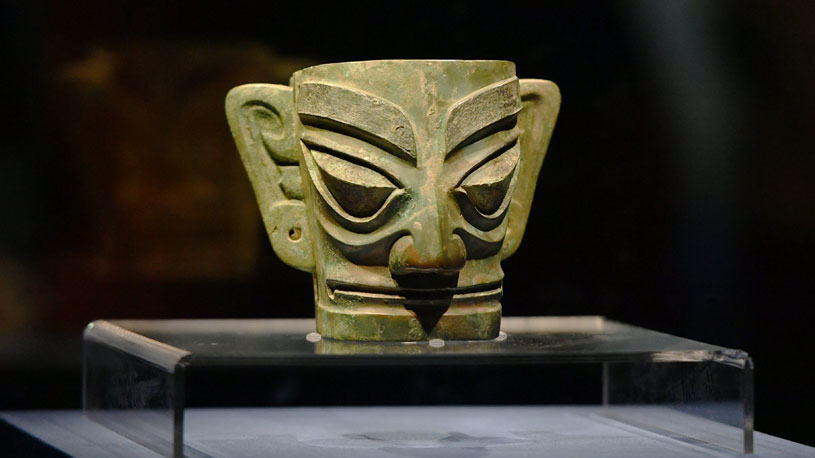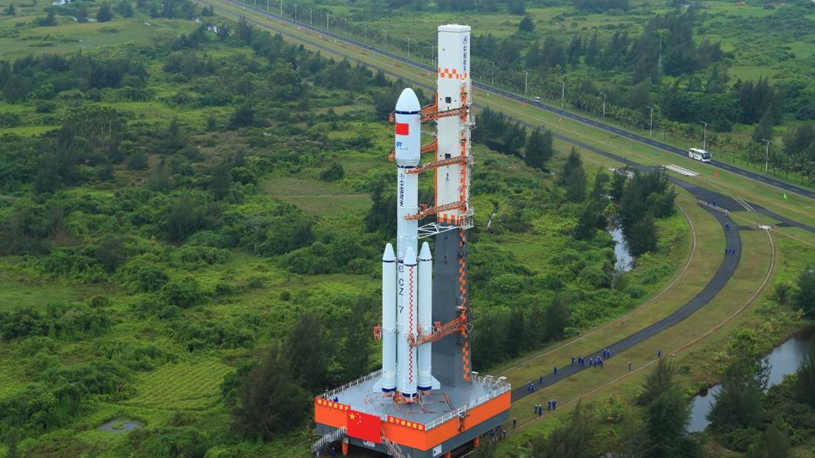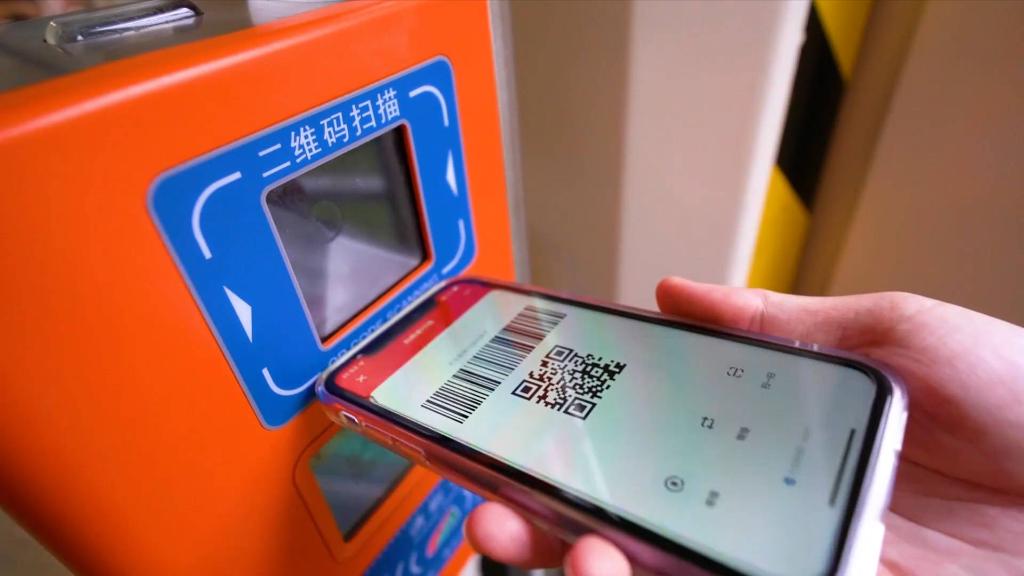*Chinese people are embracing the digital yuan with a positive attitude. Thanks to the promotion of banking institutions, internet companies, and retail terminals, digital yuan now can be used in a wider range of scenarios.
*China has stepped up efforts to promote the digital yuan with pilot programs. Since 2017, the country has tested the use of the digital yuan in over 10 places from Shenzhen to Shanghai and Xiong'an New Area.
*China's digital yuan transactions hit nearly 87.57 billion yuan at the end of 2021, as the country ramped up research and pilot use of the central bank's digital currency.
By Xinhua writers Ma Xiaocheng, Ye Ting, Meng Yingru
GUANGZHOU, May 14 (Xinhua) -- In the Canton Tower located in Haizhu District, a landmark of the southern Chinese metropolis of Guangzhou, Zhang Ling, a shopper from southwest China's Sichuan Province, bought a souvenir. Unlike her usual transactions, this time she chose to pay in digital yuan, China's digital fiat currency, or the e-CNY.
"I feel it is very convenient as it took me less than one minute to download the application and register an account," said Zhang. "There are also some discounts available now, so I'm willing to try the digital yuan."
Like Zhang, many Chinese people are embracing the digital yuan with a positive attitude. Thanks to the promotion of banking institutions, internet companies, and retail terminals, digital yuan now can be used in a wider range of scenarios.
 Undated photo shows a customer paying in digital yuan (e-CNY) at a retail store in Guangzhou, south China's Guangdong Province. (Xinhua)
Undated photo shows a customer paying in digital yuan (e-CNY) at a retail store in Guangzhou, south China's Guangdong Province. (Xinhua)
MORE CONVENIENT
China has stepped up efforts to promote the digital yuan with pilot programs. Since 2017, the country has tested the use of the digital yuan in over 10 places from Shenzhen to Shanghai and Xiong'an New Area.
The use of digital yuan is similar to that of WeChat Pay and Alipay, which are popular online payment apps in China. With QR code or Near Field Communication (NFC) techniques, the payment can be completed easily on mobile terminals of both shoppers and merchants. What makes digital yuan different is that it can still be used without a network.
Tourists could pay in digital yuan at ticket windows, merchandise stores and restaurants from April 15, according to Liu Yiying, a finance manager of the management branch under Canton Tower Cultural Tourism Development Co., Ltd.
"We launched preferential activities for digital yuan after the May Day holiday, which has attracted an increasing number of tourists," said Liu.
In the tramline in Guangzhou's Haizhu District, the upgraded checking machines in passenger cars and stations also support digital yuan payment.
Since the digital yuan payment was launched in April, hundreds of payments have been made cumulatively, with nearly 100 orders a day at most, according to Su Jun, deputy general manager of Guangzhou Tram.
"From the perspective of enterprises' financial management, digital yuan improves the efficiency as the money paid by consumers can be transferred to our account in real time," said Su.
 People walk past a sign of digital yuan (e-CNY) during the 2021 China International Fair for Trade in Services (CIFTIS) in Beijng, capital of China, Sept. 5, 2021. (Xinhua/Wu Wei)
People walk past a sign of digital yuan (e-CNY) during the 2021 China International Fair for Trade in Services (CIFTIS) in Beijng, capital of China, Sept. 5, 2021. (Xinhua/Wu Wei)
MORE INSTITUTIONS COVERED
The pilot version of the digital yuan app was released on major Android app stores and Apple's App Store on Jan 4. Currently, the designated operators of digital yuan cover major Chinese banks, such as Industrial and Commercial Bank of China (ICBC), China Construction Bank, and online banks.
"We promote discount campaigns for people using the digital yuan in supermarkets such as Guangzhou Grandbuy and Guangzhou Friendship Store, which can effectively stimulate the enthusiasm of consumers," said an official with the Guangzhou branch of ICBC. "The merchants are also free of service charge at the same time."
Many internet platforms that gather rich consumption scenes are also opening up to embrace the digital currency, such as JD.COM, Tencent, Meituan and Bilibili.
By the end of 2021, there were more than 8 million applicable scenarios of digital yuan in the pilot areas via WeChat, a social software developed by Tencent. The company said it has deeply participated in the design, research, development and operation of the digital currency since 2018.
According to data from Meituan, more than 5 million sub-wallets of digital currency were pushed to the Meituan App, and more than 4 million users spent digital yuan on Meituan from last September to early May.
Several banks in south China's metropolis of Shenzhen are to cooperate with Meituan to distribute red packets of digital yuan worth 30 million yuan (about 4.42 million U.S. dollars).
"The pilot project of Meituan is a beneficial attempt to advocate simple, moderate, green and low-carbon life through digital currency," said Cao Heping, a professor at the School of Economics of Peking University.
 A passenger pays for a bus ticket in digital yuan (e-CNY) in southwest China's Chongqing, April 29, 2022. (Photo by Luo Ling/Xinhua)
A passenger pays for a bus ticket in digital yuan (e-CNY) in southwest China's Chongqing, April 29, 2022. (Photo by Luo Ling/Xinhua)
MORE CITIES INVOLVED
The People's Bank of China (PBOC) announced in early April that the pilot program would be expanded to more domestic cities, including Tianjin, Chongqing, Guangzhou, Fuzhou, Xiamen and six cities in east China's Zhejiang Province hosting the 19th Asian Games, following its successful operation over the past years.
Beijing and Zhangjiakou were also included in the program after tests in the 2022 Olympic and Paralympic Winter Games.
A number of application modes have taken shape in wholesale and retail, catering, tourism and payment of administrative fees, which cover both online and offline scenarios and can be replicated and promoted. The scale of users, merchants and transactions in the pilot areas has grown steadily.
Guangzhou, as one of the pilot cities, has innovatively implemented new application scenarios such as granting talent subsidies and paying parallel imported cars with digital yuan and promoted the use of digital yuan in various scenarios such as transportation, supermarkets in business circles, tourism and online consumption platforms.
China's digital yuan transactions hit nearly 87.57 billion yuan at the end of 2021, as the country ramped up research and pilot use of the central bank's digital currency.
A total of 261 million personal wallets for the digital yuan had been opened, and the number of pilot scenarios had exceeded 8.08 million, said Zou Lan, an official with the PBOC.
Zou said the central bank would continue promoting research and development of the digital fiat currency and further deepen the pilot use of e-CNY in retail services, government services, and other scenarios.
(Video reporters: Li Jiale, Ye Ting; Video editors: Lin Lin, Li Qin, Ming Dajun) ■












